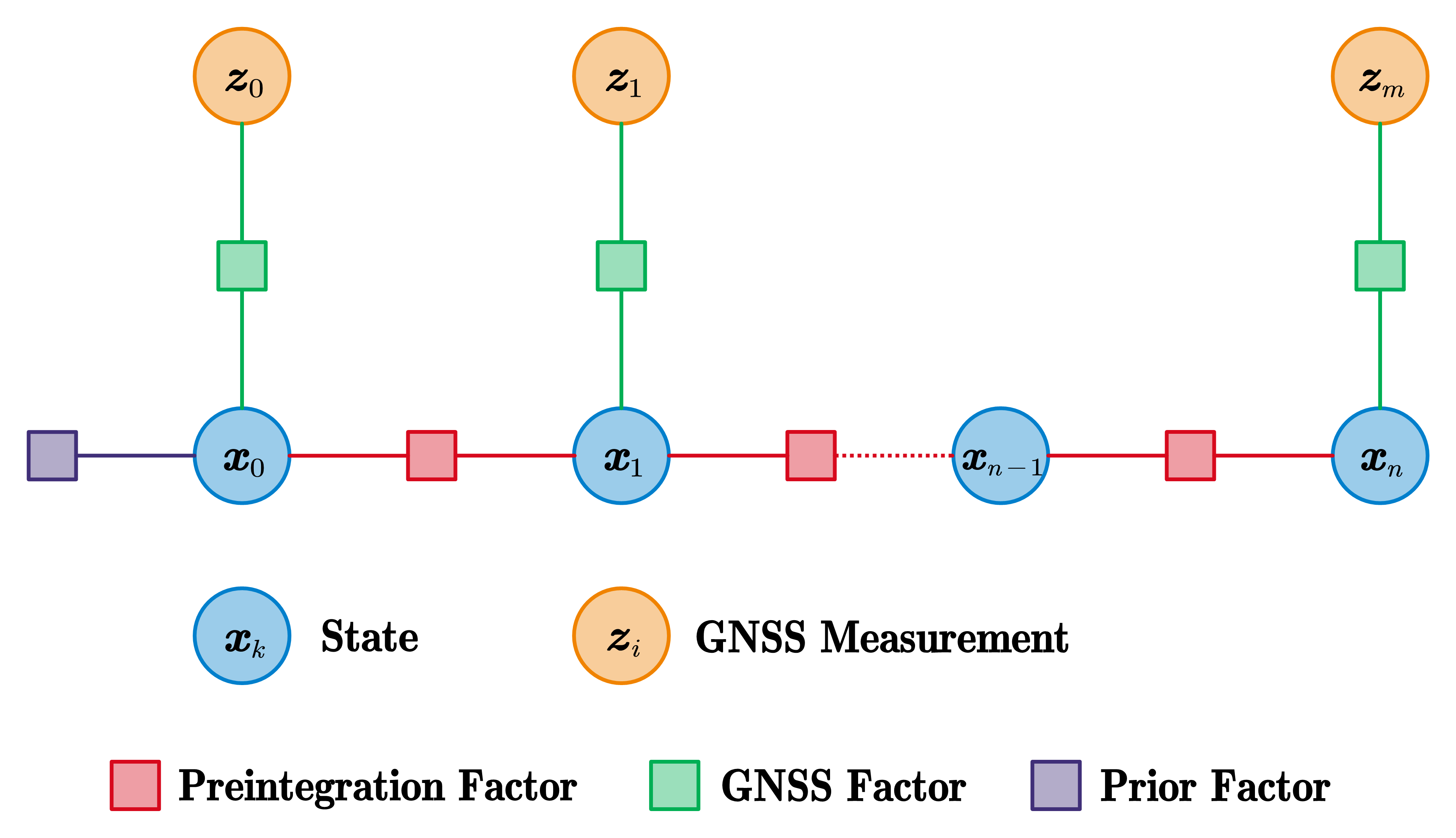We open-source OB_GINS, an optimization-based GNSS/INS integrated navigation system. The main features of OB_GINS are as follows:
-
A sliding-window optimizer for GNSS/INS integration;
-
Abstract IMU-preintegration implementation, including:
- The normal IMU preintegration without the Earth's rotation consideration;
- The normal IMU/ODO preintegration;
- The refined IMU preintegration with the Earth's rotation consideration;
- The refined IMU/ODO preintegration;
-
Implementation of the marginalization;
-
Tools for attitude parameterization and coordinate frames;
-
Tools for file IO;
Authors: Hailiang Tang, Xiaoji Niu, and Tisheng Zhang from the Integrated and Intelligent Navigation (i2Nav) Group, Wuhan University.
Related Paper:
- Hailiang Tang, Tisheng Zhang, Xiaoji Niu, Jing Fan, and Jingnan Liu, “Impact of the Earth Rotation Compensation on MEMS-IMU Preintegration of Factor Graph Optimization,” IEEE Sensors Journal, 2022.
- Le Chang, Xiaoji Niu, and Tianyi Liu, “GNSS/IMU/ODO/LiDAR-SLAM Integrated Navigation System Using IMU/ODO Pre-Integration,” Sensors, vol. 20, no. 17, p. 4702, Aug. 2020, doi: 10.3390/s20174702.
- Junxiang Jiang, Xiaoji Niu, and Jingnan Liu, “Improved IMU Preintegration with Gravity Change and Earth Rotation for Optimization-Based GNSS/VINS,” Remote Sensing, vol. 12, no. 18, p. 3048, Sep. 2020, doi: 10.3390/rs12183048.
If you use this software for your academic research, please cite our related papers; and give acknowledgement like:
English version: “The authors would like to acknowledge Dr. Xiaoji Niu and the Integrated and Intelligent Navigation (i2Nav) group from Wuhan University for providing the OB_GINS software that was used in the paper.”
中文模板:“本文作者感谢武汉大学多源智能导航实验室和牛小骥教授开源的OB_GINS软件平台。”
Contacts:
- For any technique problem, you can send an email to Dr. Hailiang Tang (thl@whu.edu.cn).
- For Chinese users, we also provide a QQ group (481173293) for discussion. You are required to provide your organization and name.
We recommend you use Ubuntu 18.04 or Ubuntu 20.04 with the newest compiler (gcc>=8.0 or clang>=6.0).
# Ubuntu 18.04
# gcc-8
sudo apt install gcc-8 g++-8
# or clang
# sudo apt install clangWe use Ceres Solver to solve the non-linear least squares problem. The supported version is Ceres Solver 2.0.0 or 2.1.0. Please follow Ceres installation instructions.
The supported version is Eigen 3.3.7~3.3.9.
sudo apt install libeigen3-devsudo apt install libyaml-cpp-devOnce the prerequisites have been installed, you can clone this repository and build OB_GINS as follows:
# Clone the repository
git clone https://github.com/i2Nav-WHU/OB_GINS.git ~/
# Build OB_GINS
cd ~/OB_GINS
mkdir build && cd build
# gcc
cmake ../ -DCMAKE_BUILD_TYPE=Release -DCMAKE_C_COMPILER=gcc-8 -DCMAKE_CXX_COMPILER=g++-8
# clang
# cmake ../ -DCMAKE_BUILD_TYPE=Release -DCMAKE_C_COMPILER=clang -DCMAKE_CXX_COMPILER=clang++
make -j8
# Run demo dataset
cd ~/OB_GINS
./bin/ob_gins ./dataset/ob_gins.yaml
# Wait until the program finishWe offer a demo dataset with configuration file, which are located at dataset directory.
One can find our open-source datasets at awesome-gins-datasets.
The data formats used in OB_GINS are the same as the formats defined at awesome-gins-datasets. You can follow the formats to prepare your own datasets, or you can modify the source code as you need.
We thanks VINS-Fusion for providing a excellent platform for SLAM learners.
The source code is released under GPLv3 license.
We are still working on improving the code reliability. For any technical issues, please contact Hailiang Tang (thl@whu.edu.cn) or open an issue at this repository.
For commercial usage, please contact Prof. Xiaoji Niu (xjniu@whu.edu.cn).
